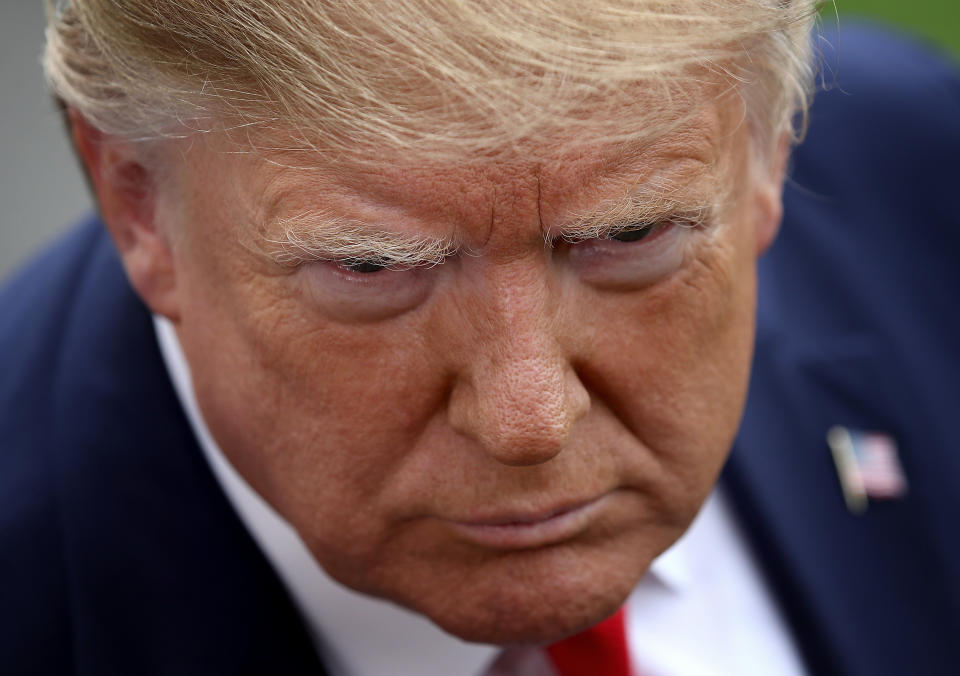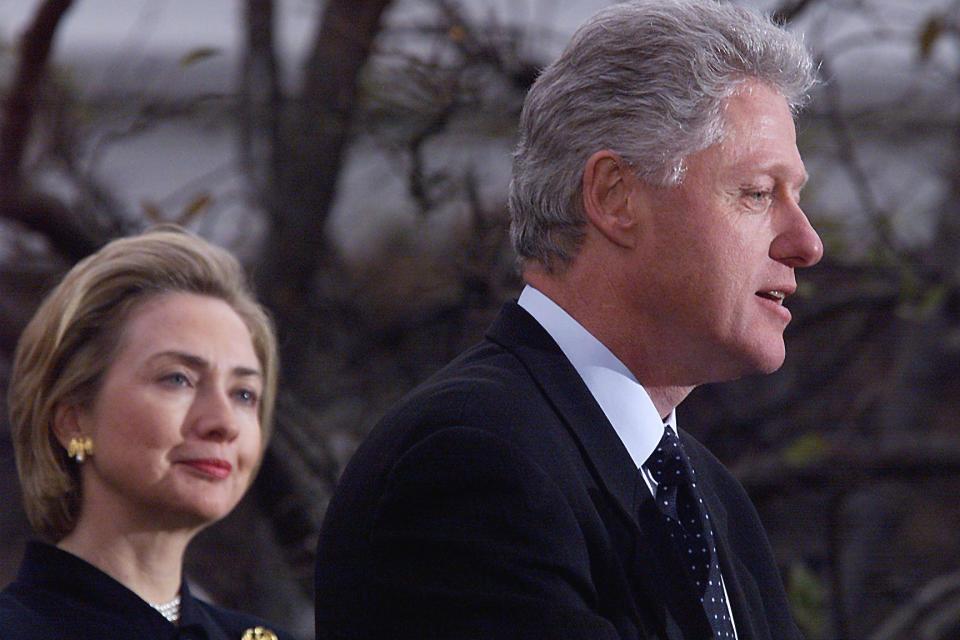Polls show Americans have come to support Trump's impeachment much faster than Nixon's or Clinton’s
- Oops!Something went wrong.Please try again later.
- Oops!Something went wrong.Please try again later.
- Oops!Something went wrong.Please try again later.
Welcome to 2020 Vision, the Yahoo News column covering the presidential race with one key takeaway every weekday and a wrap-up each weekend. Reminder: There are 109 days until the Iowa caucuses and 383 days until the 2020 election.
For the first time, a majority of Americans said this week that they supported the impeachment of President Trump. Not just in one, outlying poll — in an average of all current national polls compiled by the data journalists at FiveThirtyEight.
For Trump this polling milestone comes less than one month after reports first surfaced of a Ukraine whistleblower and roughly three weeks after House Speaker Nancy Pelosi announced the start of a formal impeachment inquiry — meaning that it represents a historical milestone as well.
Trump hasn’t just crossed the 50 percent threshold on impeachment, peaking at 50.3 percent earlier this week. He’s gotten there faster than Richard Nixon — and, for that matter, Bill Clinton, who never got there at all.
Let’s rewind. From start to finish, the Watergate scandal took more than two years to unfold. The break-in at the Democratic National Committee headquarters occurred in June 1972; Nixon was reelected that November; the burglars’ trial began in January 1973; top White House aides resigned in April; a special prosecutor was appointed in May; the Saturday Night Massacre went down in October; formal impeachment proceedings began in May 1974; the House Judiciary Committee passed articles of impeachment in July; and Nixon resigned in August.

But for the vast majority of that time, public support never passed the 50 percent mark. In June 1973, right after the Senate Watergate Committee launched televised hearings, only 19 percent of Americans told Gallup that Nixon should be impeached and removed from office. By November, after the Saturday Night Massacre, that number had ticked up to 38 percent. But it wasn’t until August of the following year — after articles of impeachment had been approved and after the Supreme Court forced Nixon to release the transcript of a “smoking gun” tape that showed he had helped orchestrate the cover-up — that a majority of Americans came around to the view that he should be impeached and removed.
In other words, if you start the clock with the Senate hearings, it took 14 months for Nixon to get where Trump has gotten in one. Start with formal impeachment proceedings — which began three months before support for Nixon’s impeachment breached 50 percent — and Trump still outpaces his ignominious predecessor by some distance.
The contest with Clinton, meanwhile, isn’t even close. In early 1998, Clinton denied that he’d had a sexual relationship with Monica Lewinsky, both publicly and in a sworn deposition; in August he admitted that he’d lied; in September independent counsel Kenneth Starr released a report accusing Clinton of committing perjury and trying to influence witnesses to hide the affair; in October the House Judiciary Committee launched a formal impeachment inquiry; in December the House approved two articles of impeachment against Clinton; and in February 1999 the Senate rejected both articles, acquitting the president.
Throughout that entire process, however, public sentiment barely budged: Polls consistently showed that only a quarter to a third of Americans favored Clinton’s impeachment. The highest that number ever got — retrospectively, in late 1999 — was 44 percent, which is still 5 to 6 percentage points lower than Trump’s number today.

Not all impeachments, of course, are created equal. Some, like Clinton’s, come to be seen as partisan. Others, like Nixon’s, come to be seen as justified.
So far the polling suggests that America is more inclined to see Trump’s impeachment as justified than partisan. To be sure, 2019 is not 1998 or 1974. Pollsters ask the impeachment question in different ways, so direct comparisons are difficult. There are several forces at work today that almost guarantee his impeachment will take a different path than Clinton’s or Nixon’s. America is far more polarized than it was decades ago, and Trump is far more polarizing than any of his predecessors.
This cuts both ways. The president’s approval rating has been stuck between 38 and 42 percent since March 2017, and a majority of Americans have disapproved of his job performance since then as well. In contrast, Clinton enjoyed approval ratings in the 60 to 70 percent range the entire time Republicans were trying to impeach him, and Nixon’s fluctuated wildly, falling from a high of 68 percent in January 1973 to a low of about 25 percent for most of the last year of his presidency. In a less tribal time, voters were much more willing to break with their party, either to back a president they believed was being unfairly persecuted or to oppose a president who clearly deserved impeachment. That’s no longer the case, and while such polarization helps keep Trump broadly unpopular, it also helps inoculate him against mass GOP defections. Trump’s brazenness — the way he openly asks Ukraine and China to investigate his political rivals, for instance — also serves to blunt some of the impact of new revelations.

Even so, crossing the 50 percent threshold on impeachment in record time — even if the FiveThirtyEight average has since dipped just below the 50 percent mark — still carries serious risks.
Impeachment is by definition a political process, and politics is driven by public opinion. Public opinion, in turn, will have a greater effect on Trump’s impeachment than on any prior impeachment, for the simple fact that it will be the only impeachment in U.S. history to unfold on the eve of a presidential election year.
To survive impeachment and win a second term, Trump needs to keep his party united. But senators and House members want to win reelection too, and they’ll be watching the polls as closely as the pundits. If Nixon’s impeachment proved anything, it’s that new evidence can emerge suddenly, changing everything. The facts matter. In 1974, congressional Republicans had backed Nixon uniformly for more than a year — until the smoking gun surfaced. And then they didn’t.
Is that likely to happen again? No. But the more impeachment gains in the polls, the less improbable it becomes.
_____
Download the Yahoo News app to customize your experience.
Read more from Yahoo News:
Greta Thunberg: Powerful men 'want to silence' young climate activists
Driven from Central America by gangs and finding refuge in Kentucky: One woman's story
'I talk about power because you're not supposed to': Why Stacey Abrams still wants to be president
Nation's intelligence officers are resigned to serving a president who doesn't trust them
Before Black Lives Matter: Exhibition pays tribute to an earlier NYPD killing of unarmed black man
360: U.S. pulls support for Syrian Kurds: What happens next?
PHOTOS: In monochrome — Venezuelan fishermen among oil ruins





